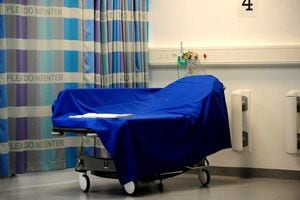Sandwell Hospital brings in extra beds to cope
Dozens of temporary beds have been brought in to help Sandwell's main hospital cope in the wake of admissions over the winter.

But hospital chiefs today say they want to cut this number to reduce the spend on agency workers.
Sandwell and West Birmingham Hospitals NHS Trust, which runs Sandwell Hospital, says it has used 60 additional beds since January.
Most were brought into wards which were closed but were reopened to help accommodate the influx of patients.
Trust chief executive Toby Lewis said urged more work to be done with care homes to cut the number of 'avoidable emergency admissions' to help stretched hospital departments.
It comes after watchdog group Healthwatch Sandwell produced a report highlighting areas for concerns at the the borough's main hospital.
Healthwatch officers visited Sandwell Hospital at the end of 2015, and discussed concerns with 11 patients or carers about hospital standards.
The report found 'failures to provide appropriate nursing care, communications issues regarding patients and family, including end of life circumstances, and limitations in the complaints system'.
Bosses, in a response which goes before Sandwell Council's health scrutiny committee on Thursday (31), say they keen to discuss the issues arising from the report.
But the trust says that there are no 'safety concerns' to come out of its findings.
The hospital trust said that its own spot checks had 'identified concerns about care in one particular ward'.
"That ward was closed because we felt we were no longer able to staff that ward to the standard we pride ourselves on," the trust said in a response to the scrutiny committee.
They added: "We do remain concerned by the large number of extra beds open at Sandwell this winter, which place additional pressure on all clinicians, and increase our reliance on temporary staff."
Mr Lewis, in a statement, said: "We are working to close these beds, and had reduced the number to 20, but have not been able to sustain that improvement going into Easter."
He said: "We want to work with partners to tackle unplanned arrivals, where someone is better cared for elsewhere."
He added: "We have ourselves invested to support care homes, which are a major source of avoidable emergency admissions, and want to see that work expanded further.
"In our own work, and on a wider scale that of others, we need to fund what is proven to work."





